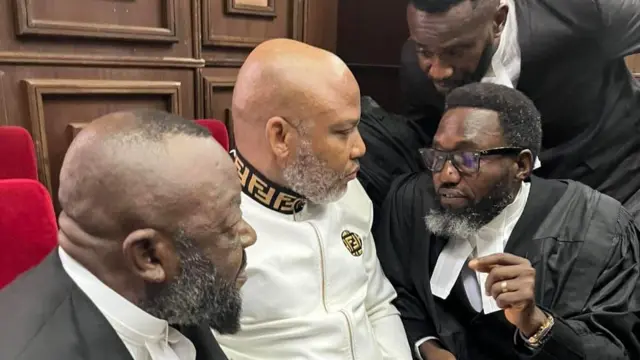Nnamdi Kanu Opens Defence, Names Wike, Buratai, Uzodinma, Others as Witnesses
The Federal High Court has been notified by Nnamdi Kanu, the detained leader of the Indigenous People of Biafra (IPOB), that he is prepared to start his defense.
In a new request, Kanu—who is on trial for a treasonous felony—assured the court that he was “ready to commence his defense” as previously instructed.
This reportedly occurs soon after activist Omoyele Sowore organized a demonstration calling for his release in Abuja.
Kanu stated in the October 21 motion that his choice was consistent with the court’s October 16, 2025, order, which instructed him to begin his defense on October 24, 2025.
Days prior to his most recent filing, Kanu had filed a preliminary objection contesting the court’s authority to continue hearing the matter. On the same day that a group of court-appointed medical professionals deemed him medically competent to stand trial, that objection was submitted.
In his personally signed application, Kanu declared, “I am ready to do so in accordance with the order of this honorable court made on the 16th day of October 2015, directing the defendant to commence his defense on the 24th day of October 2025.”
The leader of IPOB will call 23 witnesses.
The leader of IPOB revealed that 23 witnesses would be called, split into two groups: crucial and compellable witnesses and ordinary but material witnesses.
He listed a number of well-known Nigerians as compellable, including:
Former Defense Minister Gen. Theophilus Danjuma (retd); former Army Staff Chief Gen. Tukur Buratai (retd); Babajide Sanwo-Olu, Governor of Lagos State; Hope Uzodinma, Governor of Imo State; Nyesom Wike, Minister of the Federal Capital Territory; Dave Umahi, Minister of Works; and Dr. Okezie Ikpeazu, former Governor of Abia State.
Along with a number of unidentified witnesses, the embattled IPOB leader also cited Yusuf Magaji Bichi, the current Director-General of the DSS, Ahmed Rufai Abubakar, the previous Director-General of the National Intelligence Agency, and Abubakar Malami (SAN), the immediate past Attorney General of the Federation.
“Under Section 232 of the Evidence Act, 2011, the second category of witnesses shall be summoned,” Kanu stated.
Kanu Requests a 90-Day Defense
Given the quantity of witnesses and the breadth of his evidence, Kanu reportedly requested a 90-day window from the presiding judge, Justice James Omotosho, to complete his defense.
In order to “deny the allegations and explain the political context of his statements and actions,” he also stated that he plans to personally testify in court.
“I will testify on my own behalf, denying the accusations, giving a sworn statement of the facts, and outlining the political background of my remarks and deeds.”
Kanu promised the court that his defense team would not waste judicial time and that all willing witnesses would provide sworn testimony.
“The public and the honorable court would be interested in justice that is not only carried out but also perceived as having been carried out,” he wrote.
On the same day that Kanu filed his motion, 13 people—including his special lawyer, Aloy Ejimakor—who had participated in demonstrations calling for Kanu’s release were ordered to be remanded by an Abuja magistrate court.
In violation of articles 152, 114, and 113 of the Penal Code, the group—which included Kanu’s brother, Emmanuel Kanu, and eleven other people—were charged by the police with criminal conspiracy, disobedience to lawful order, inciting commotion, and public annoyance.
Joshua Emmanuel, Wilson Anyalewechi, Okere Kingdom Nnamdi, Clinton Chimeneze, Gabriel Joshua, Isiaka Husseini, Onyekachi Ferdinand, Amadi Prince, Edison Ojisom, Godwill Obioma, and Chima Onuchukwu are among those named in the two distinct First Information Reports (FIRs).
Following a brief pause in proceedings, the magistrate directed that the defendants be placed under remand at the Kuje Correctional Center until their arraignment, scheduled for October 24, could take place.
According to reports, Tuesday’s events signal a new stage in Kanu’s protracted trial, which has involved years of court cases, political unrest, and public demonstrations. The government insists that the IPOB leader must be held accountable for his alleged crimes against the state, even as supporters continue to call for his unconditional release.
Both domestic and foreign observers following Nigeria’s judicial and human rights procedures are anticipated to pay close attention to the events of the next several days, especially his scheduled defense on October 24.

